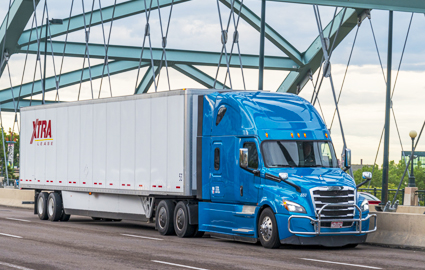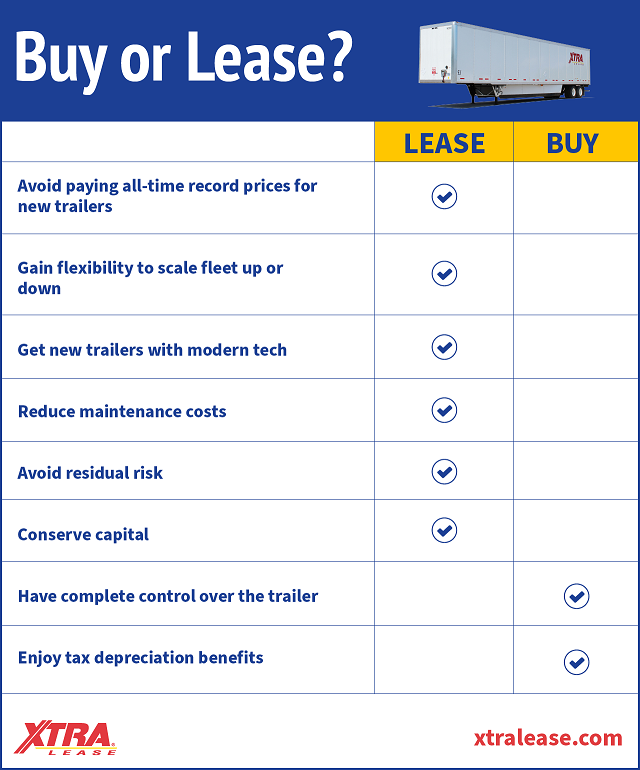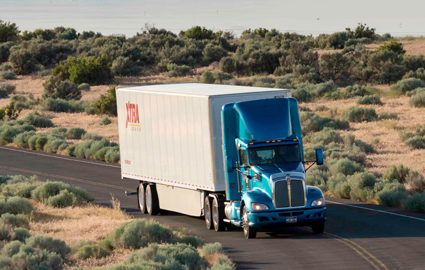
How Do You Rent, Lease, and Own Trailers in an Unpredictable Market?
How do you handle the uncertainties of moving freight in an unpredictable market, like during and after a pandemic?
Who knew we'd have one of the hottest freight markets many carriers and shippers have ever seen? And a tangled supply chain whose knots are still strangling parts of the freight transportation market? And inflation and ongoing attempts to correct it? Then...well, who knows what's next?
If you, like most everyone else who ships or hauls freight, are scrambling for trailers, consider some options that might prove more flexible for you.
Those options start with the idea that you don’t have to buy every trailer you need.
Here are some of the benefits of renting and leasing trailers that you may not have thought about.
How does owning vs leasing trailers compare in flexibility?
- Increased demand has filled most OEM's build slots in 2023. That adds up to a long wait for a new van or reefer.
- To buy a used trailer, you have to find one with the specs and vintage you need and the used market is also suffering from lack of inventory and high prices; it can be easier to rent or lease a trailer to meet your contract obligations.
- Customer demands have always been changeable and are even more so today. If you over-order, you could end up with a bunch of idle trailers in your yard next year. You can return trailers your rented and leased trailers at the end of their term, minimizing
the risk of being stuck with unusable trailers when your busy season ends.
- More shippers and carriers are building trailer pools to handle the pressure for quick turnaround, to support drop-and-hook arrangements, and to make the best use of an increasingly scarce component: the truck driver. Renting and leasing can help
you build your pool quickly and scale back quickly when you need to.
- The pandemic has made detention time a make-or-break element of your business. Trailer tracking helps you keep your
drivers and equipment moving and minimize detention time (or get compensated for it with data from your tracking system to back your claim). It’s pretty easy to find trailers with telematics, and even cargo sensors, to lease and you may
find it a lot quicker than buying trailers or retrofitting your existing equipment.
- If you want to keep a late model fleet with up-to-date technology, you have to keep buying. That can work fine when your customer’s demands are loud and frequent or if regulations remain consistent. Leasing can give you a quick way to get the
latest equipment with the newest technology to stay compliant.
- You were just awarded a three-year contract. If you buy trailers to meet your new customer’s needs, what will you do with those trailers three years from now? You don’t want to be out capital you could use to keep your business running.
- What if you want to say yes to a great dry freight customer who’s asked if you can haul refrigerated cargo? You’ve never pulled reefers before. Do you know what a new or used reefer costs or which specs are best or what kind of maintenance
a reefer needs? By renting or leasing reefers you can try equipment, have it maintained and determine if this is the right freight for your company.
- Trailers age. Before you buy, you have to think about which specs, tires and aerodynamics will work best for you not only today, but also years from now. (The average useful life of a dry van is almost 15 years.) You’ll also have the burden of selling your older, less productive trailers. Not so when you rent or lease.
This table compares key aspects of owning and leasing so you can easily compare:

Note: The information provided in this article isn't intended to be legal or financial advice. Please consult a qualified professional for that kind of advice.
Here are a few more takes on buying vs leasing trailers
